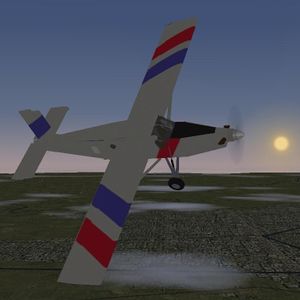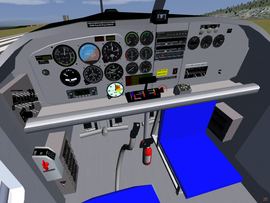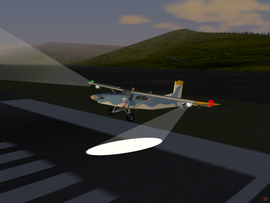Pilatus PC-6 Porter: Difference between revisions
Jump to navigation
Jump to search
mNo edit summary |
(→Aircraft help: Switch to the new "keytable" class, and usage of {{key press}}.) |
||
| Line 14: | Line 14: | ||
== Aircraft help == | == Aircraft help == | ||
{| class=" | {| class="keytable" | ||
! Key | ! Key | ||
! Description | ! Description | ||
|- | |- | ||
| Ctrl | | {{key press|Ctrl|L}} | ||
| Toggle tailwheel lock | | Toggle tailwheel lock | ||
|} | |} | ||
Revision as of 12:41, 23 July 2016
 | |
| Type | 1 engine utility |
|---|---|
| Author(s) | Detlef Faber, JeeP cheney |
| FDM | YASim |
| --aircraft= | PC6-B2H4 |
| Status | Production |
Pilatus PC-6 Porter is a single-engined utility aircraft. It is famous in the aviation world for its Short Take-off and Landing (STOL) performance on almost any type of terrain; it can take-off within a distance of 195 metres (640 ft) and land within a distance of 130 metres (427 ft) while carrying a payload of 1,500 kg (3,300 lb).
Aircraft help
| Key | Description |
|---|---|
| Ctrl+L | Toggle tailwheel lock |
Takeoff
- Flaps down 10 degrees.
- Apply 100% Engine RPM While accelerating raise the tail.
- Be prepared to use Rudder to counteract Swing.
Climb and cruise
- The plane picks up speed fast so be sure to raise Flaps below 80 kts.
- The best climb speed is 80-90 kts.
- Cruise Power is at 90% Engine RPM.
Landing
- Lower Flaps under 80 kts and set Prop to Max RPM.
- Approach Speed is 60-70 kts.
- Approach the threshold with 60 kts.
- Don't reduce power too early as the idle prop acts as effective speed brake.
Features
- Complete 3D cockpit with lots of controllable switches
- Engine and structural failure simulation
- Co-pilot comments
- Livery selection
External links
| ||||||||

